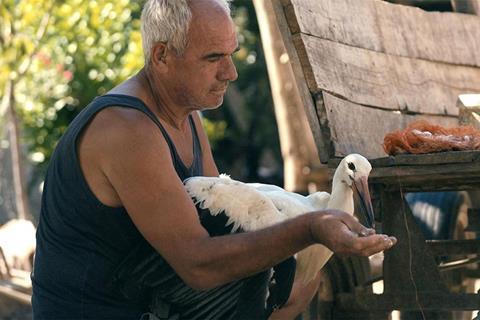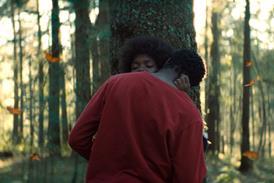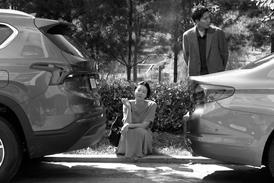Lyrical hybrid documentary charts the highs and lows of rural life in modern Macedonia

Dir: Tamara Kotevska. North Macedonia, USA/UK. 2025. 81mins
A story drawn from 17th century Macedonian folklore is ribboned, to lyrical effect, through this intimate portrait of a farmer, whose traditional way of life is threatened by economic pressures in modern Macedonia. Tamara Kotevska’s exquisite hybrid documentary The Tale Of Silyan shares common ground with her double Oscar-nominated picture Honeyland. The film explores themes of symbiosis with the natural world, disrupted balances and migration. And it focuses on a bond; in this case that of Nikola the farmer and the injured white stork that he nurses back to health.
A beautiful paean to a delicately interconnected ecosystem
There’s a rich, mythic quality to Kotevska’s storytelling which is heightened by a narration recounting the generations-old story of Silyan, a son who rejected the toil of life as a farmer and was cursed by his father to be turned into a stork. The aching loneliness felt by the angry father and his estranged bird-son is mirrored by that of Nikola when his daughter, wife and beloved grandchild are forced to move to Germany for work and the promise of a better life.
Kotevska’s filmmaking exists at the poetic, magical realist end of the non-fiction spectrum. Don’t expect an analysis of agricultural market forces or shifts in Macedonian government policies, although the real-life ramifications of these are clear to see. It’s an impressive achievement: a beautiful and gently melancholy paean to a delicately interconnected ecosystem disrupted by the pressures of modern life in Macedonia. While it might struggle to match Honeyland’s breakout success, this should be a festival favourite and could figure in awards conversations going forward.
For sturdy 60-year-old Nikola, farming is a family business. Cinematographer Jean Dakar’s unobtrusive and perceptive lens captures the way that Nikola and his wife Jana scythe the fields together, their movements perfectly synchronised. There’s a sense of celebration as the youngest family member, Nikola’s tiny granddaughter Illina, helps with the bricklaying for the second storey extension that will eventually house her bedroom. And the annual watermelon harvest brings the whole clan together, arranged as a human chain to haul the weighty fruits from field to truck.
Picking delicately through the fields alongside the farmers, we see the white storks. Otherworldly creatures that are woven into the fabric of life in the local community, which hosts one of the largest stork populations in Europe, the birds have learned that the sound of sputtering old tractors signifies a bounty of food: frogs, snakes and assorted small rodents are snatched up to be fed to the chicks in their haphazard nests. But the balance of this mutually beneficial arrangement is toppling – the farmers find that prices have plummeted and their crops languish unsold at the wholesale market. In a not remotely subtle piece of symbolism, the clouds gather low in the wide-screen mountain vistas, and thunder sounds ominously.
When Nikola’s daughter and her husband relocate to Germany, Jana goes with them to provide childcare. But Nikola is left behind, trying to sell off his family land at knockdown prices and eking out a living driving a bulldozer at the dump. As the fields lie fallow, the storks follow the farmers to the easy pickings of the dump; many are injured or die as a result.
As with Honeyland, the distinctive appeal of The Tale Of Silyan comes in part from the choice of central character. Nikola’s life may be hard, his work may be back-breaking, but he’s a jolly figure, with his gleeful, child-like humour, bristling white hair and misshapen apology for a hat. But mainly, it is drawn from the elegant editing of the wealth of material captured by Kotevska and her team. The storytelling is so deft and slick, it almost feels scripted at times. But there are certain elements that you can’t dictate in advance, like the almost spiritual connection that grows between Nikola and the gangly, damaged bird that he rescues from the dump, and which, in turn, reaffirms Nikola’s bond with the land.
Production companies: Ciconia Film, Concordia Studio, The Corner Shop
International sales: Dogwoof, cleo@dogwoof.com
Producers: Tamara Kotevska, Jean Dakar, Anna Hashmi, Jordanco Petkovski
Cinematography: Jean Dakar
Editing: Martin Ivanov
Music: Joe Wilson Davies, Hun Oukpark
Main cast: Nikola Conev, Jana Coneva, Aleksandra “Ana” Coneva, Aleksandar Conev, Ilina Coneva, Ilija Stojkovski, Stojco Filipov
























